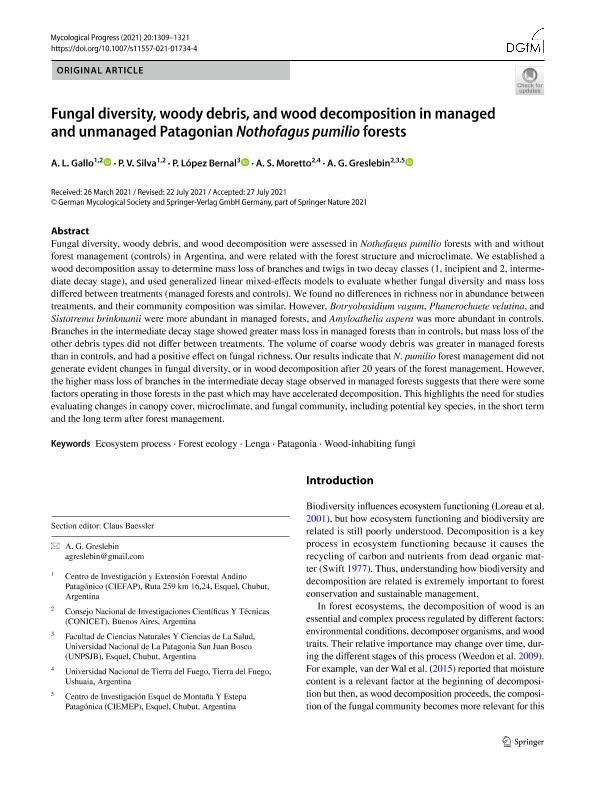Artículo
Fungal diversity, woody debris, and wood decomposition in managed and unmanaged Patagonian Nothofagus pumilio forests
Gallo, Ana Laura ; Silva, Patricia Valeria
; Silva, Patricia Valeria ; López Bernal, P.; Moretto, Alicia Susana
; López Bernal, P.; Moretto, Alicia Susana ; Greslebin, Alina Gabriela
; Greslebin, Alina Gabriela
 ; Silva, Patricia Valeria
; Silva, Patricia Valeria ; López Bernal, P.; Moretto, Alicia Susana
; López Bernal, P.; Moretto, Alicia Susana ; Greslebin, Alina Gabriela
; Greslebin, Alina Gabriela
Fecha de publicación:
10/2021
Editorial:
Springer Heidelberg
Revista:
Mycological Progress
ISSN:
1617-416X
Idioma:
Inglés
Tipo de recurso:
Artículo publicado
Clasificación temática:
Resumen
Fungal diversity, woody debris, and wood decomposition were assessed in Nothofagus pumilio forests with and without forest management (controls) in Argentina, and were related with the forest structure and microclimate. We established a wood decomposition assay to determine mass loss of branches and twigs in two decay classes (1, incipient and 2, intermediate decay stage), and used generalized linear mixed-effects models to evaluate whether fungal diversity and mass loss differed between treatments (managed forests and controls). We found no differences in richness nor in abundance between treatments, and their community composition was similar. However, Botryobasidium vagum, Phanerochaete velutina, and Sistotrema brinkmanii were more abundant in managed forests, and Amyloathelia aspera was more abundant in controls. Branches in the intermediate decay stage showed greater mass loss in managed forests than in controls, but mass loss of the other debris types did not differ between treatments. The volume of coarse woody debris was greater in managed forests than in controls, and had a positive effect on fungal richness. Our results indicate that N. pumilio forest management did not generate evident changes in fungal diversity, or in wood decomposition after 20 years of the forest management. However, the higher mass loss of branches in the intermediate decay stage observed in managed forests suggests that there were some factors operating in those forests in the past which may have accelerated decomposition. This highlights the need for studies evaluating changes in canopy cover, microclimate, and fungal community, including potential key species, in the short term and the long term after forest management.
Palabras clave:
ECOSYSTEM PROCESS
,
FOREST ECOLOGY
,
LENGA
,
PATAGONIA
,
WOOD-INHABITING FUNGI
Archivos asociados
Licencia
Identificadores
Colecciones
Articulos(CIEMEP)
Articulos de CENTRO DE INVESTIGACION ESQUEL DE MONTAÑA Y ESTEPA PATAGONICA
Articulos de CENTRO DE INVESTIGACION ESQUEL DE MONTAÑA Y ESTEPA PATAGONICA
Citación
Gallo, Ana Laura; Silva, Patricia Valeria; López Bernal, P.; Moretto, Alicia Susana; Greslebin, Alina Gabriela; Fungal diversity, woody debris, and wood decomposition in managed and unmanaged Patagonian Nothofagus pumilio forests; Springer Heidelberg; Mycological Progress; 20; 10; 10-2021; 1309-1321
Compartir
Altmétricas



